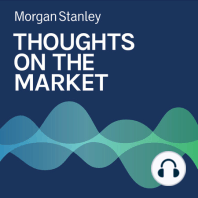3 min listen

Global Economy: Central Bank Policy in a Time of Volatility
Global Economy: Central Bank Policy in a Time of Volatility
ratings:
Length:
9 minutes
Released:
Mar 25, 2023
Format:
Podcast episode
Description
As markets contend with the recent volatility in the banking sector, global central banks face the challenge of continuing to combat inflation against this updated backdrop. Chief Cross-Asset Strategist Andrew Sheets and Global Chief Economist Seth Carpenter discuss.----- Transcript -----Andrew Sheets: Welcome to Thoughts on the Market. I'm Andrew Sheets, Chief Cross-Asset Strategist for Morgan Stanley. Seth Carpenter: And I'm Seth Carpenter, Global Chief Economist. Andrew Sheets: And today on the podcast we'll be talking about Global Central Bank policy and what's next amidst significant market volatility. It's Friday, March 24th at 4 p.m. in London. Seth Carpenter: And it's noon here in New York. Andrew Sheets: So Seth I know that both of us have been running around over the last week speaking with clients, but it's really great to catch up with you because we're coming to the end of the first quarter and yet I feel like a year's worth of things have happened in global central banks and the economic narrative. Maybe just take a step back and help us understand how you're thinking about the global economy right now. Seth Carpenter: You're absolutely right, Andrew. There is so much going on this year, so it's worth taking a step back. Coming into this year, we were looking for the economy to slow down. And I think it's just critical to remember why, central banks everywhere that are fighting inflation are raising interest rates intentionally to tighten financial conditions in order to slow their economies down and thereby bring down inflationary pressures. The trick, of course, is not slowing things down so much that they actively cause a recession. So the Fed having hiked interest rates already, we came into the year expecting a few more hikes, but then the data got stronger and Chair Powell opened the door to maybe going back to 50 basis point hikes. And now we've got this development in the banking sector. But it's not as if so far the central banks have seen evidence that things have gone so far that they're going to cause a recession. So all of this sounds a little bit simple maybe, but the key thing here is how can they calibrate whether or not they've done enough in terms of tightening financial conditions or if they've gone too far. Andrew Sheets: That's a really important point, because if you look at what the market is now pricing from the Federal Reserve, it's expecting significant rate cuts through the end of the year. And it's pricing in a scenario where the Fed has effectively gone far enough or maybe they've even gone too far and has to reverse their policy pretty quickly. How do you think about the path forward from here and how likely is it that central banks will ease as much as markets are currently pricing? Seth Carpenter: I mean, I do think there is a path for central banks to ease, but that is not and let me just start off with that is not our baseline scenario for this year. You led off with inflation and I think that's an appropriate place to start because what we heard clearly from central bankers in all of the developed markets was they are still hyper focused on inflation being too high and the need to bring it down. So one way of thinking about what's going on is that there's just a continuation of the normal tightening of monetary policy, so bank funding costs have gone up. If you read the the publications that our colleague Betsy Graseck, who runs Bank Equity Research in North America, she's pointed out that there's been a clear increase in bank funding costs that compresses net interest margins and that should, as a result, have an effect on what's going on with credit extension. In that version of the world, the Fed is in this fine tuning version of the world where they have to feel their way to the right degree of tightness and maybe they overdo it a little bit and then eventually pull back. I think the other version of the world that's very hard to get your mind around it is absolutely not our
Released:
Mar 25, 2023
Format:
Podcast episode
Titles in the series (100)
Mike Wilson: 3 Summer Surprises Investors Could Be Missing by Thoughts on the Market